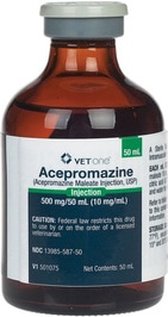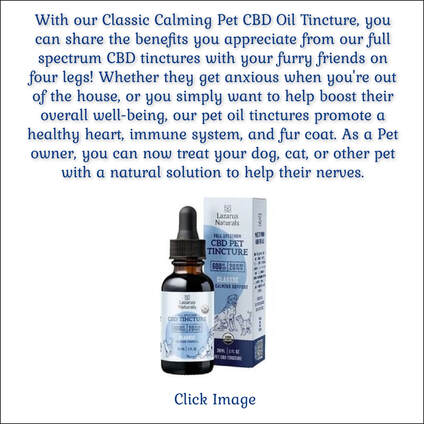Before reading this article, I want to add that...holistic remedies are not mentioned here so I will give you recommendations for storms, fireworks etc. Rescue Remedy for Pets is a good one to try. (Check out Aldaron Essences as well). Look into calming collars, thundershirts, herbs such as passion flower, chamomile, Vervain and many more. DRUGS are not a healthy answer to an issue. Always seek alternative methods PLEASE! If nothing at all works without diligently trying all natural alternatives, you can try a safe antidepressant. I do not recommend Valium or alike.
Ace is known to be used with standard surgery medications. Always check to see what is being given to your pet before/during surgery.
This medication made my dog crazy for several months after surgery. Chewing up everything. Now she is back to normal.
Ace is some bad stuff. ~H.O.P.S.
Ace is known to be used with standard surgery medications. Always check to see what is being given to your pet before/during surgery.
This medication made my dog crazy for several months after surgery. Chewing up everything. Now she is back to normal.
Ace is some bad stuff. ~H.O.P.S.
Acepromazine (Promace ®) and Chlorpromazine

Acepromazine (Promace ®) and Chlorpromazine are two commonly used phenothiazine tranquilizers in veterinary clinics. Their primary method of action is as a Dopamine antagonist, which suppresses both normal and abnormal behavior, including a decrease in coordinated locomotor responsiveness. They are not anti-anxiety drugs and do not provide any analgesia (pain relief).
Ace has a variety of uses (ex: anti-nausea, anti-emetic, decrease itching due to allergies) but is routinely used to sedate fearful or aggressive dogs and cats prior to veterinary visits or as an at-home remedy for noise phobias (thunderstorms, fireworks).
Chlorpromazine (Thorazine ®) is almost identical to Acepromazine and is just as potent.
When called Thorazine, it elicits a much stronger reaction from audiences as it was the first antipsychotic to be commonly used in the 1950s and 1960s. Chlorpromazine is used in veterinary medicine as an antiemetic (anti-vomiting and nausea) and a tranquilizer.
Research has shown these drugs functions primarily as chemical restraints without affecting the animal’s emotional behavior. While under the effect of Ace, the animal still has a very strong fear, anxiety, avoidance or arousal response, but it does not physically display these reactions and is less able to react. The dog or cat appears calm and relaxed but mentally is lucid and still having an intense emotional reaction to its surroundings. Ace is a dissociative agent and prevents the patient from understanding his environment in a logical manner. So, the actual fear level of the animal is increased. Compounding the situation, the animal is being restrained and it makes a negative association with the entire experience.
Ace has a variety of uses (ex: anti-nausea, anti-emetic, decrease itching due to allergies) but is routinely used to sedate fearful or aggressive dogs and cats prior to veterinary visits or as an at-home remedy for noise phobias (thunderstorms, fireworks).
Chlorpromazine (Thorazine ®) is almost identical to Acepromazine and is just as potent.
When called Thorazine, it elicits a much stronger reaction from audiences as it was the first antipsychotic to be commonly used in the 1950s and 1960s. Chlorpromazine is used in veterinary medicine as an antiemetic (anti-vomiting and nausea) and a tranquilizer.
Research has shown these drugs functions primarily as chemical restraints without affecting the animal’s emotional behavior. While under the effect of Ace, the animal still has a very strong fear, anxiety, avoidance or arousal response, but it does not physically display these reactions and is less able to react. The dog or cat appears calm and relaxed but mentally is lucid and still having an intense emotional reaction to its surroundings. Ace is a dissociative agent and prevents the patient from understanding his environment in a logical manner. So, the actual fear level of the animal is increased. Compounding the situation, the animal is being restrained and it makes a negative association with the entire experience.
According to veterinary behaviorist Dr. Vint Virga, DVM, ACVB, this is one of the reasons, why clinics are seeing so many animals, who have been previously given Ace, continuing to be fearful during veterinary exams. It becomes a never-ending cycle of chemical restraint and continued fear for the patient. Another potential danger from using Ace, is their fear may intensify to a level, where they override the physiological effects and can physically break through the chemical restraint. The animal seems ‘out of it’, but is having an intense emotional reaction and bites. Dr. Virga has seen serious trauma (typically to faces) to veterinary staff, when trying to restrain an animal on Ace and breakthrough occurs. He has also observed that clients have an overall negative response to the use of Ace for their pet and speak unfavorably of it. Owners leave with a highly sedated animal, which is ataxic or immobile and the drug effects may require up to 12 hours to disappear.
Ace is appropriate as a tranquilizer for the happy, jubilant, bouncing Labrador, who has no anxiety, stress or fear. These dogs simply need to be slowed down so an examination, ear swab, mouth exam can be performed. Ace is also appropriate when used as a pre-operative agent in a balanced anesthesia, with other drugs (ex: atropine) as it helps to lower the overall amount of anesthesia required and has antidysrhythmic (prevents arrhythmia, erratic heart rhythm) effects.
Ace is appropriate as a tranquilizer for the happy, jubilant, bouncing Labrador, who has no anxiety, stress or fear. These dogs simply need to be slowed down so an examination, ear swab, mouth exam can be performed. Ace is also appropriate when used as a pre-operative agent in a balanced anesthesia, with other drugs (ex: atropine) as it helps to lower the overall amount of anesthesia required and has antidysrhythmic (prevents arrhythmia, erratic heart rhythm) effects.
|
Side effects of Ace include (but are not limited to): increased noise sensitivity and startle response, decreased respiration, bradycardia leading to cardiovascular collapse (dogs and cats), hypotension, erratic thermoregulation leading to hypothermia or hyperthermia, a decrease in seizure thresholds, muscle spasms, excitation and sudden aggression (break-through response), absent pulse, unconsciousness. The duration of Ace also varies in each individual, thus making the fearful or aggressive patient even more unpredictable.
Note: Ace should never be used as a tranquilizer for animals traveling due to the erratic thermoregulation effects (inability to control body temperature in cold or hot conditions). |
Veterinary behaviorists now prefer the use of Benzodiazapenes such as Diazepam (Valium) and Alprazolam (Xanax) as alternative drugs which affect the central nervous system and actually reduce anxiety, stress and fear. They have a calming and amnesic effect on the patient and their fast acting effects begin within 30 minutes to 2 hours after oral administration. The dog or cat is sedated, its muscles are relaxed and their fear and anxiety is greatly reduced or eliminated.
Ace, used to sedate fearful animals, is no longer appropriate. Its use should be discontinued. We, as owners, need to advocate for our pets and do what is in their best interest both physically and emotionally. So, if your veterinarian wants to prescribe Acepromazine or Chlorpromazine to ‘calm’ your fearful Fido or Fluffy, politely decline the offer and ask for one of the newer alternative medications.
For veterinarians who want to research the effects of Acepromazine and Chlorpromazine drugs, two very good reference books are “The Handbook of Behavior Problems of the Dog and Cat” by Landsberg, Hunthausen, and Ackerman, and “Veterinary Psychopharmacology” by Sharon Crowell-Davis.
*The author would like to thank Dr. Virga for providing detailed information on Acepromazine and Chlorpromazine. Dr. Virga is a board-certified Diplomate of the American College of Veterinary Behaviorists. He is currently the president of Behavioral Medicine for Animals SM.
Dr. Virga currently attends companion animal cases East Greenwich and zoo animal cases on site at zoological gardens and wild animal parks. His special interests include stereotypic behaviors, self-directed behaviors, and environmental and social enrichment for captive wildlife.
For veterinarians who want to research the effects of Acepromazine and Chlorpromazine drugs, two very good reference books are “The Handbook of Behavior Problems of the Dog and Cat” by Landsberg, Hunthausen, and Ackerman, and “Veterinary Psychopharmacology” by Sharon Crowell-Davis.
*The author would like to thank Dr. Virga for providing detailed information on Acepromazine and Chlorpromazine. Dr. Virga is a board-certified Diplomate of the American College of Veterinary Behaviorists. He is currently the president of Behavioral Medicine for Animals SM.
Dr. Virga currently attends companion animal cases East Greenwich and zoo animal cases on site at zoological gardens and wild animal parks. His special interests include stereotypic behaviors, self-directed behaviors, and environmental and social enrichment for captive wildlife.
Don’t ‘Ace’ the Fear:
Why Acepromazine may make your dog’s fireworks fear worse!
By Dr. M. Becker
Is what you’re doing to help your dog with his fireworks and thunderstorm fears making them worse?
Fear of fireworks and thunderstorms can ruin a pet’s summer, but sometimes our best efforts to help our pets feel better have the opposite effect. One of the worst offenders is the drug acepromazine, known as Ace.
Once widely prescribed for noise phobias, acepromazine not only doesn’t work, it might make things much worse. From an article by my friend and colleague Karen L. Overall, MA, VMD, PhD, DACVB, CAAB, one of the leading veterinary behaviorists in the world, published in DVM360:
I know that the common “treatment” for storm and noise phobias and veterinary office visits is acepromazine. In truth, I wish this medication would be placed at the far back of a top shelf and used only exceptionally. Acepromazine is a dissociative anesthetic meaning that it scrambles perceptions. Ask yourself if a scrambling of perceptions will make an anxious or uncertain dog worse or better. It’s always worse, and we make many if not most dogs more sensitive to storms by using this drug. In part this is also because sensitivity to noise is heightened.
Is what you’re doing to help your dog with his fireworks and thunderstorm fears making them worse?
Fear of fireworks and thunderstorms can ruin a pet’s summer, but sometimes our best efforts to help our pets feel better have the opposite effect. One of the worst offenders is the drug acepromazine, known as Ace.
Once widely prescribed for noise phobias, acepromazine not only doesn’t work, it might make things much worse. From an article by my friend and colleague Karen L. Overall, MA, VMD, PhD, DACVB, CAAB, one of the leading veterinary behaviorists in the world, published in DVM360:
I know that the common “treatment” for storm and noise phobias and veterinary office visits is acepromazine. In truth, I wish this medication would be placed at the far back of a top shelf and used only exceptionally. Acepromazine is a dissociative anesthetic meaning that it scrambles perceptions. Ask yourself if a scrambling of perceptions will make an anxious or uncertain dog worse or better. It’s always worse, and we make many if not most dogs more sensitive to storms by using this drug. In part this is also because sensitivity to noise is heightened.
This is a recipe for disaster for these dogs, and, in fact, they learn to be more fearful and more reactive because of these associations. If what you need is sedation – acepromazine can be an acceptable adjuvant, but it makes most of my really fearful and really reactive patients worse, so all sorts of other drug combos can work better and do less harm than is done by the routine use of acepromazine.
One more “don’t”: Whatever you do, don’t lock your pet in a room or area they can escape from. Dogs and cats have been known to get out of homes and garages, destroy crates, and break leashes and collars to escape when terrified by storms and fireworks. The Fourth of July is a major day for shelters taking in lost pets — or, worse, pet owners never finding them.
One more “don’t”: Whatever you do, don’t lock your pet in a room or area they can escape from. Dogs and cats have been known to get out of homes and garages, destroy crates, and break leashes and collars to escape when terrified by storms and fireworks. The Fourth of July is a major day for shelters taking in lost pets — or, worse, pet owners never finding them.
Avoid this new drug also. VERY DANGEROUS!
FDA Approves Pexion for Treating Noise Aversion in Dogs
December 4, 2018
The U.S. Food and Drug Administration announced today that its Center for Veterinary Medicine has approved Pexion (imepitoin tablets) to treat noise aversion in dogs. Dogs with noise aversion are sensitive to loud noises such as fireworks, street/traffic noises, and gun shots. Dogs may show their distress through hiding; vocalizing (whining, barking, howling); panting, shaking or trembling; or may vomit, urinate or defecate. Some dogs may damage furniture, doors, dog beds, or other items in their surroundings.
The effectiveness of Pexion was evaluated in a study of client-owned dogs that had previously demonstrated noise aversion behaviors in response to fireworks. The dogs received either Pexion or a placebo twice daily for two days prior to New Year’s Eve, when fireworks events were scheduled to be held. Treatment continued through New Year’s Eve. The owners evaluated their dogs’ responses to the fireworks at four pre-set intervals and scored the level of 16 different behaviors. The overall score for the dogs receiving Pexion were lower (better) than those receiving the placebo.
The owners also evaluated the overall effect of treatment based on previous New Year’s Eve fireworks experiences with the dogs. The owners of 66 percent of dogs receiving Pexion scored the overall treatment effect as excellent or good, compared with 25 percent of dogs receiving the placebo.
Pexion is administered to the dog twice daily starting two days before an expected noise event and continued through the event. It is available in 100 mg or 400 mg scored tablets and is dosed according to the weight of the dog.
The most common adverse reactions seen in the study were ataxia (difficulty standing and walking), increased appetite, lethargy, and vomiting.
The owners of three of the 90 dogs that received Pexion in the effectiveness trial also reported that their dogs became aggressive, including growling towards a young child and lack of restraint or self-control towards other dogs. Certain drugs used to reduce anxiety, such as Pexion, may lead to lack of self-control of fear-based behaviors and may therefore result in a change in aggression level. The label information accompanying Pexion notes the recommendation that owners should carefully observe their dogs during treatment.
Pexion will be available by prescription only, because a licensed veterinarian is needed to determine whether Pexion is an appropriate treatment.
As with any drug, veterinarians and owners of dogs that experience adverse events should report them to the manufacturer, who is required to report them to the FDA. Veterinarians and pet owners can also file a report directly with the FDA by following the instructions at How to Report Animal Drug Side Effects and Product Problems.
For more detail about the data and studies that the FDA reviewed in its evaluation and approval of Pexion, please see the Freedom of Information Summary.
Pexion is manufactured by Boehringer Ingelheim Vetmedica Inc., of St. Joseph, Missouri.
The U.S. Food and Drug Administration announced today that its Center for Veterinary Medicine has approved Pexion (imepitoin tablets) to treat noise aversion in dogs. Dogs with noise aversion are sensitive to loud noises such as fireworks, street/traffic noises, and gun shots. Dogs may show their distress through hiding; vocalizing (whining, barking, howling); panting, shaking or trembling; or may vomit, urinate or defecate. Some dogs may damage furniture, doors, dog beds, or other items in their surroundings.
The effectiveness of Pexion was evaluated in a study of client-owned dogs that had previously demonstrated noise aversion behaviors in response to fireworks. The dogs received either Pexion or a placebo twice daily for two days prior to New Year’s Eve, when fireworks events were scheduled to be held. Treatment continued through New Year’s Eve. The owners evaluated their dogs’ responses to the fireworks at four pre-set intervals and scored the level of 16 different behaviors. The overall score for the dogs receiving Pexion were lower (better) than those receiving the placebo.
The owners also evaluated the overall effect of treatment based on previous New Year’s Eve fireworks experiences with the dogs. The owners of 66 percent of dogs receiving Pexion scored the overall treatment effect as excellent or good, compared with 25 percent of dogs receiving the placebo.
Pexion is administered to the dog twice daily starting two days before an expected noise event and continued through the event. It is available in 100 mg or 400 mg scored tablets and is dosed according to the weight of the dog.
The most common adverse reactions seen in the study were ataxia (difficulty standing and walking), increased appetite, lethargy, and vomiting.
The owners of three of the 90 dogs that received Pexion in the effectiveness trial also reported that their dogs became aggressive, including growling towards a young child and lack of restraint or self-control towards other dogs. Certain drugs used to reduce anxiety, such as Pexion, may lead to lack of self-control of fear-based behaviors and may therefore result in a change in aggression level. The label information accompanying Pexion notes the recommendation that owners should carefully observe their dogs during treatment.
Pexion will be available by prescription only, because a licensed veterinarian is needed to determine whether Pexion is an appropriate treatment.
As with any drug, veterinarians and owners of dogs that experience adverse events should report them to the manufacturer, who is required to report them to the FDA. Veterinarians and pet owners can also file a report directly with the FDA by following the instructions at How to Report Animal Drug Side Effects and Product Problems.
For more detail about the data and studies that the FDA reviewed in its evaluation and approval of Pexion, please see the Freedom of Information Summary.
Pexion is manufactured by Boehringer Ingelheim Vetmedica Inc., of St. Joseph, Missouri.


















